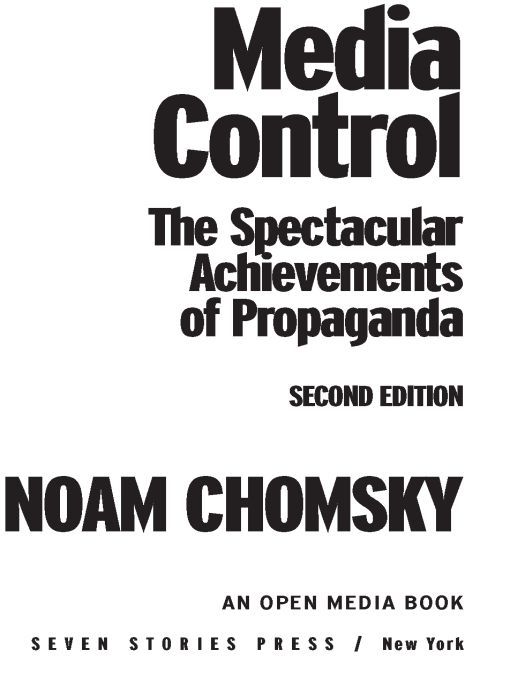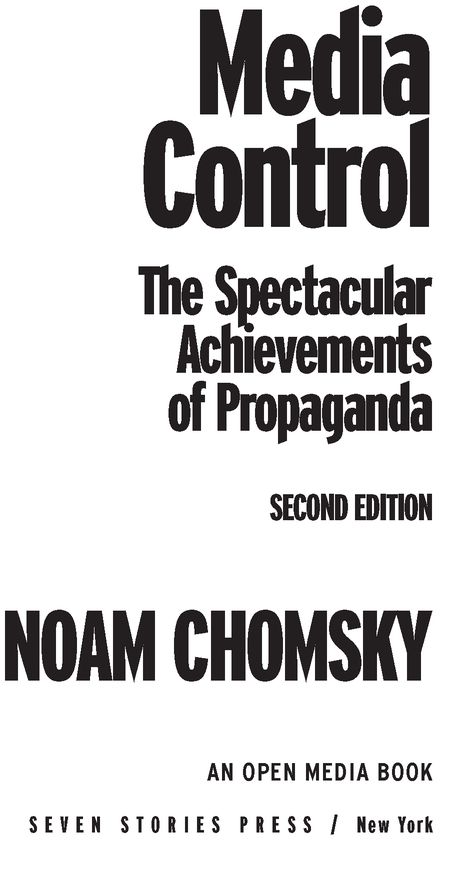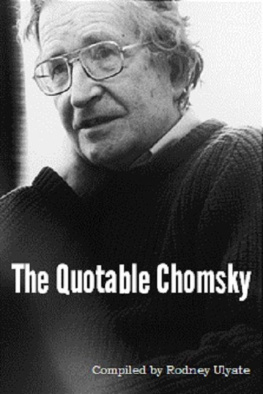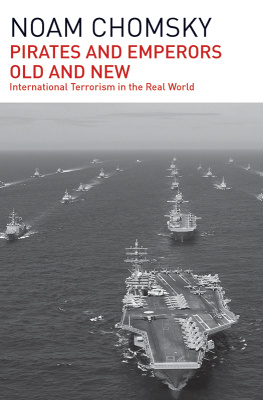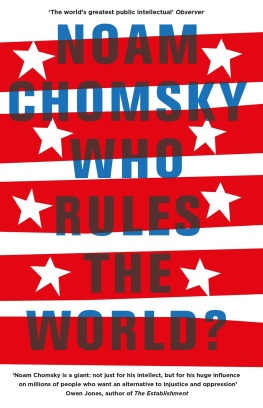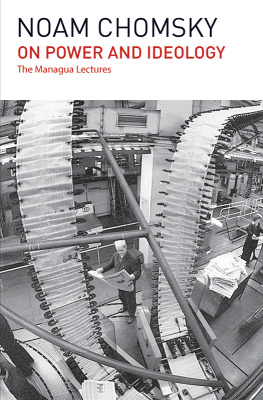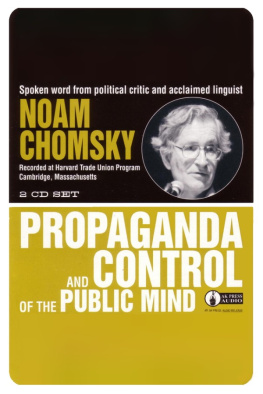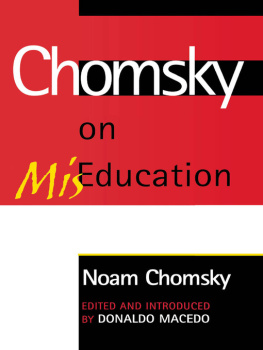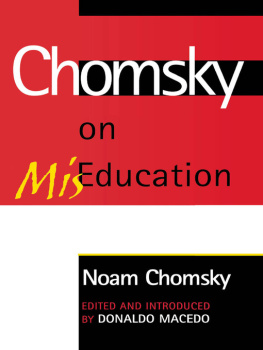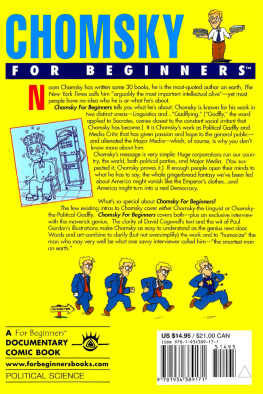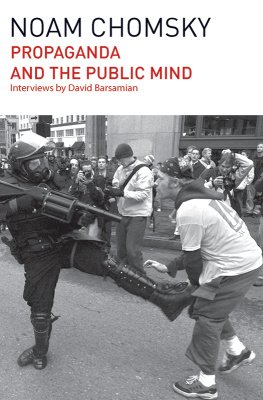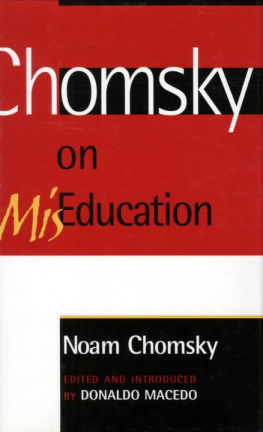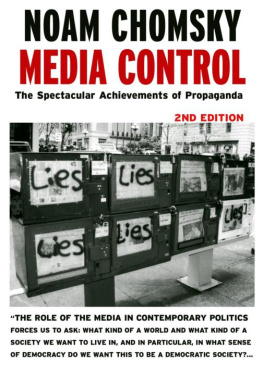Table of Contents
MEDIA CONTROL The Spectacular Achievements of Propaganda
THE ROLE OF THE MEDIA in contemporary politics forces us to ask what kind of a world and what kind of a society we want to live in, and in particular in what sense of democracy do we want this to be a democratic society? Let me begin by counter-posing two different conceptions of democracy. One conception of democracy has it that a democratic society is one in which the public has the means to participate in some meaningful way in the management of their own affairs and the means of information are open and free. If you look up democracy in the dictionary youll get a definition something like that.
An alternative conception of democracy is that the public must be barred from managing of their own affairs and the means of information must be kept narrowly and rigidly controlled. That may sound like an odd conception of democracy, but its important to understand that it is the prevailing conception. In fact, it has long been, not just in operation, but even in theory. Theres a long history that goes back to the earliest modern democratic revolutions in seventeenth century England which largely expresses this point of view. Im just going to keep to the modern period and say a few words about how that notion of democracy develops and why and how the problem of media and disinformation enters within that context.
EARLY HISTORY OF PROPAGANDA
Lets begin with the first modern government propaganda operation. That was under the Woodrow Wilson Administration. Woodrow Wilson was elected President in 1916 on the platform Peace Without Victory. That was right in the middle of the World War I. The population was extremely pacifistic and saw no reason to become involved in a European war. The Wilson administration was actually committed to war and had to do something about it. They established a government propaganda commission, called the Creel Commission, which succeeded, within six months, in turning a pacifist population into a hysterical, war-mongering population which wanted to destroy everything German, tear the Germans limb from limb, go to war and save the world. That was a major achievement, and it led to a further achievement. Right at that time and after the war the same techniques were used to whip up a hysterical Red Scare, as it was called, which succeeded pretty much in destroying unions and eliminating such dangerous problems as freedom of the press and freedom of political thought. There was very strong support from the media, from the business establishment, which in fact organized, pushed much of this work, and it was, in general, a great success.
Among those who participated actively and enthusiastically in Wilsons war were the progressive intellectuals, people of the John Dewey circle, who took great pride, as you can see from their own writings at the time, in having shown that what they called the more intelligent members of the community, namely, themselves, were able to drive a reluctant population into a war by terrifying them and eliciting jingoist fanaticism. The means that were used were extensive. For example, there was a good deal of fabrication of atrocities by the Huns, Belgian babies with their arms torn off, all sorts of awful things that you still read in history books. Much of it was invented by the British propaganda ministry, whose own commitment at the time, as they put it in their secret deliberations, was to direct the thought of most of the world. But more crucially they wanted to control the thought of the more intelligent members of the community in the United States, who would then disseminate the propaganda that they were concocting and convert the pacifistic country to wartime hysteria. That worked. It worked very well. And it taught a lesson: State propaganda, when supported by the educated classes and when no deviation is permitted from it, can have a big effect. It was a lesson learned by Hitler and many others, and it has been pursued to this day.
SPECTATOR DEMOCRACY
Another group that was impressed by these successes was liberal democratic theorists and leading media figures, like, for example, Walter Lippmann, who was the dean of American journalists, a major foreign and domestic policy critic and also a major theorist of liberal democracy. If you take a look at his collected essays, youll see that theyre subtitled something like A Progressive Theory of Liberal Democratic Thought. Lippmann was involved in these propaganda commissions and recognized their achievements. He argued that what he called a revolution in the art of democracy, could be used to manufacture consent, that is, to bring about agreement on the part of the public for things that they didnt want by the new techniques of propaganda. He also thought that this was a good idea, in fact, necessary. It was necessary because, as he put it, the common interests elude public opinion entirely and can only be understood and managed by a specialized class of responsible men who are smart enough to figure things out. This theory asserts that only a small elite, the intellectual community that the Deweyites were talking about, can understand the common interests, what all of us care about, and that these things elude the general public. This is a view that goes back hundreds of years. Its also a typical Leninist view. In fact, it has very close resemblance to the Leninist conception that a vanguard of revolutionary intellectuals take state power, using popular revolutions as the force that brings them to state power, and then drive the stupid masses toward a future that theyre too dumb and incompetent to envision for themselves. The liberal democratic theory and Marxism-Leninism are very close in their common ideological assumptions. I think thats one reason why people have found it so easy over the years to drift from one position to another without any particular sense of change. Its just a matter of assessing where power is. Maybe there will be a popular revolution, and that will put us into state power; or maybe there wont be, in which case well just work for the people with real power: the business community. But well do the same thing. Well drive the stupid masses toward a world that theyre too dumb to understand for themselves.
Lippmann backed this up by a pretty elaborated theory of progressive democracy. He argued that in a properly functioning democracy there are classes of citizens. There is first of all the class of citizens who have to take some active role in running general affairs. Thats the specialized class. They are the people who analyze, execute, make decisions, and run things in the political, economic, and ideological systems. Thats a small percentage of the population. Naturally, anyone who puts these ideas forth is always part of that small group, and theyre talking about what to do about those others. Those others, who are out of the small group, the big majority of the population, they are what Lippmann called the bewildered herd. We have to protect ourselves from the trampling and roar of a bewildered herd. Now there are two functions in a democracy: The specialized class, the responsible men, carry out the executive function, which means they do the thinking and planning and understand the common interests. Then, there is the bewildered herd, and they have a function in democracy too. Their function in a democracy, he said, is to be spectators, not participants in action. But they have more of a function than that, because its a democracy. Occasionally they are allowed to lend their weight to one or another member of the specialized class. In other words, theyre allowed to say, We want you to be our leader or We want

